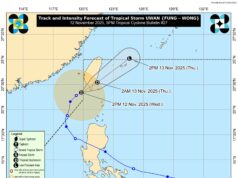WB sees dim PHL growth outlook
By Beatrice M. Laforga
Reporter
THE Philippine economy may contract by as much as two percent this year as the coronavirus disease 2019 (COVID-19) crisis persists, a World Bank (WB) economist said on Wednesday.
World Bank Lead Economist and Program Leader for Brunei, Malaysia, Philippines and Thailand Souleymane Coulibaly said they are currently revising the economic forecast for the Philippines for 2020.
“It will not be the six percent growth. Maybe it will be zero this year, or even minus one or two (-1, -2 contraction) this year. But next year, we will see resumption in the economy,” Mr. Coulibaly said during the BUSINESSWORLD INSIGHTS online forum on Wednesday.
In its Regional Economic Update report published earlier this month, the World Bank downgraded its earlier 6.1% growth forecast for the Philippine economy and gave a growth forecast range of 3% to -0.5%, depending on the extent of the impact of the COVID-19 outbreak and the enhanced community quarantine (ECQ) in Luzon.
“In our upcoming economic update, we’ll revise our estimates. It will definitely be downward because by the time we were providing numbers in (early) April, the health situation was not as bad as what we have now,” Mr. Coulibaly said.
“It will be lower, definitely, I can’t put out numbers yet because we need to do the calculations, my team is already working on that, we are just waiting for first quarter data,” he added.
First-quarter gross domestic product (GDP) data will be released on May 7.
Government economic managers have said the best-case scenario for the economy is flat growth, even warning of a possible one percent contraction this year.
Economic activity in Luzon, which accounts for over 70% of GDP, has been at a near-standstill since mid-March as strict lockdown measures are implemented to contain the virus outbreak.
The Development Budget Coordination Committee (DBCC) has yet to release its official updated macroeconomic assumptions, as it continues to monitor and assess the impact of the health crisis and restrictive measures on the economy.
Among those that have downgraded their Philippine growth forecasts are ASEAN+3 Macroeconomic Research Office (0.2% from the previous 4.5% estimate), the Asian Development Bank (2% from 6.2%) and International Monetary Fund (0.6% from 6.3%).
NOT ENOUGH FISCAL SPACE
Mr. Coulibaly also warned that the government may not have enough fiscal space to maneuver if the economic fallout from the pandemic widens.
“The spillover effect in many other economies, even if these middle-income economies are doing the right thing, will be large. Governments need to handle this the right way, first by having the health crisis under control. If it takes longer, then we will have a fiscal challenge because the government cannot continue to borrow to provide for daily income earners,” he said.
The Department of Health on Wednesday reported that confirmed cases of the coronavirus reached 8,212, with the death toll at 558 and recoveries at 1,023.
In that same forum, Philippine Chamber of Commerce and Industry (PCCI) President Benedicto V. Yujuico said small businesses raised concerns that government financial assistance is not sustainable in the long term.
Eventually, Mr. Yujuico said the government will have to allow companies to reopen and trust that they will do their part to observe safety measures to avoid further spread of COVID-19.
“They know that this is not sustainable, that they will just look at the Department of Finance for additional funding, loans and guarantees. It is after the third, fifth month that they are now thinking about, they are worried that it is not sustainable, they do not want to overburden the government, they are very thankful for the help, but they need to do something for their survival,” he said.
Foundation for Economic Freedom (FEF) President Calixto V. Chikiamco said a lot of micro, small and medium enterprises (MSMEs) are facing difficulties as their operations remain halted due to the extension of the ECQ until May 15.
“In the two months (lockdown), they are out of working capital and I think facing bankruptcy,” Mr. Chikiamco said.
Data from the Philippine Statistics Authority showed MSMEs account for 99.52% or 998,342 of the 1.003 million business enterprises operating in the country in 2018.
For Mr. Coulibaly, the government will have to ensure that the health situation is under control before deciding to ease lockdown restrictions.
“As soon as consumers decide to behave normally, the economy will slowly go back to where it was before the crisis,” he said.
Finance Assistant Secretary Antonio G. Lambino III said that the government has the “strong desire” to restart the economy as soon as possible but is making sure that there will be a U-shaped recovery, and not a W-shaped where a second wave of outbreak is expected to hit harder.
Mr. Coulibaly said the government, private sector and the entire country should take advantage of the opportunities arising from the health crisis and “strengthen the medium-long term prospect of the country” by focusing on the health care and education systems, as well as the digital economy.
FEF’s Mr. Chikiamco also urged the government to implement structural reforms as financial assistance programs of the government, which includes cash handouts to poor families and employees affected by the lockdown, are “useless if institutions are incapable of delivering.”
For instance, he mentioned that the Department of Social Welfare and Development (DSWD) struggled to identify and distribute cash aid to recipients of the P200-billion Social Amelioration Program, while applications for the P51-billion wage subsidy program faced backlogs as the website keeps on crashing.
To address this, the national government has ordered local governments to release the cash handouts to recipients of the SAP within 24 hours after the funds were downloaded according to Mr. Lambino of the DoF.
Further, application and distribution processes for the wage subsidy program are automated and will be quicker he said, while issues on the website were solved by launching other options to apply such as via email or cloud-based systems.



